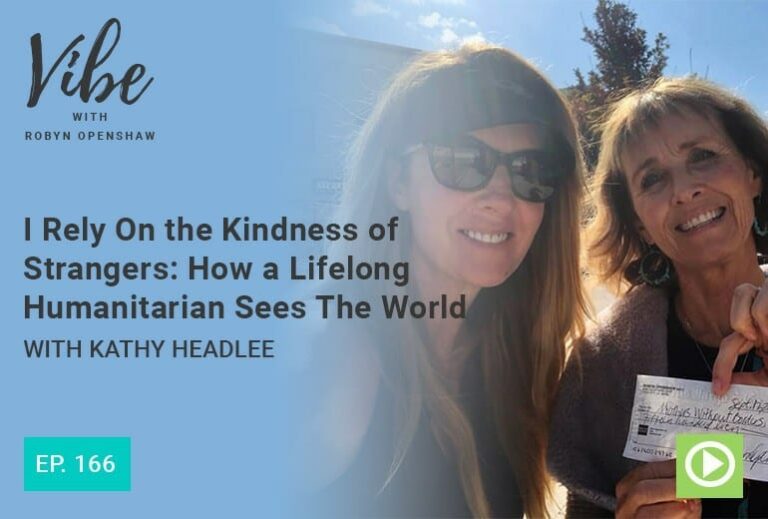Ep. 166: I Rely On the Kindness of Strangers: How a Lifelong Humanitarian Sees The World with Kathy Headlee | Vibe Podcast

Podcast: Play in new window
Kathy Headlee is one of my all-time heroes. I’ve helped her and her company, Mothers Without Borders, for 11 years, feeding and educating AIDS-orphaned and at-risk kids in Zambia. What’s it like, to spend half your life in Africa, among the world’s poorest people? Kathy shares some stories that will melt your heart and help you consider that you’re a citizen of a world without borders.
LINKS AND RESOURCES:
Learn more about Mothers Without Borders
Become one of the kind strangers by Donating to the Cause
EPISODE HIGHLIGHTS WITH Kathy Headlee:
- [06:36] Orphans. What do the children of Zambia face? How do they survive?
- [16:36] AIDS. Why doesn’t the medication for AIDS help people in Africa?
- [22:02] Education and Unemployment. Kathy Headlee explains why “A quick fix in education” would fail to correction unemployment.
- [26:09] You can help! Robyn matches every donation to the cause.
- [32:05] A day in the life. Kathy Headlee talks about what a typical day of a volunteer with Mothers Without Borders looks like.
TRANSCRIPT:
This transcript has been edited for clarity. Robyn: Hey everyone, it’s Robyn Openshaw. Welcome back to the Vibe show. Today is a very special episode. It was a good time for me to talk with my friend Kathy Headlee, who founded Mothers Without Borders. John and I are on day 10 of the Green Smoothie Girl detox and I feel like 1 million bucks, but we eat less. I find that I give thanks more and I think about food more. I have unlimited food around me — there’s a grocery store a mile away. It’s a great time for me to think about people who are further away on this planet who are suffering. The great quote that came out of this episode was a little story that Kathy will tell you. A woman who takes care of 15 grandchildren — many of the [children] had been orphaned — who says, “I rely on the kindness of strangers.” You’ve probably met [this week’s guest] before if you follow me on social media or our newsletter. Kathy Headlee, who has, for 30 years, given her life — including while she was a single mom raising four children by herself — [to build Mothers Without Borders]. [Being a single mom with four children] is a part of what made me resonate with what she was doing and her message. At BYU 11 years ago [for] education week, I heard her speak, and I was like, “I have to get involved.” I invited her over to my home. I said, “I just want to help however I can.” Over the years I’ve done a variety of fundraisers, including one time when I ate nothing but green smoothies for 30 days and asked my audience to help. This year we’re taking it much bigger. I’m asking you to look deep inside your heart when you hear about the plight of the people in Zambia, [and figure out] if you’re willing to be part of the solution and help with the needs of Mothers Without Borders. These are women who have given their entire career to the children [and] hopping the globe to give and give and give. I’m excited to introduce you to my good friend Kathy Headlee who is a real deal. She is very much who she sounds like she is. Welcome to the Vibe show, Kathy Headlee of Mothers Without Borders. Kathy Headlee: Thank you. I am very happy to be here Robyn. Robyn: We had lunch in September, and Green Smoothie Girl gave you our first check for folks who are doing our Flush Fast, which is our 3-Day Modified Fast. Anybody who participates [helps] feed a child in Zambia for three days. I’ve already explained to my audience how I met you. Why don’t you tell your story of how you came to fly to Zambia and spend a lot of your life over there and give a lot of your life to 500 kids. Tell your story. Kathy Headlee: Okay. I actually started Mothers Without Borders right around 1989 and was working in Mexico and then in Romania and a bunch of other different countries. Our primary mission is “Nurturing [and] caring for orphaned and vulnerable children.” I went wherever there was a need — wherever there was a large population of orphaned and vulnerable kids. That’s led me all around the world. In about 1996, it became pretty clear to me that the largest amount of orphaned and vulnerable children were in Africa — primarily due to the AIDS pandemic. There are a lot of other things — war, unrest, other diseases, and other reasons — why kids end up losing their families. In about 2000, [I]made the decision to move all of our work out of the other countries that we’d been in around the world and focus everything exclusively into Zambia. I got on a plane and flew to Zambia in the year 2000 and began meeting with community leaders and other local people in organizations who were working to meet the needs of the orphaned and vulnerable children in their communities. Our primary purpose at Mothers Without Borders is to look for ways that we can partner with local people who are looking to meet the needs of orphaned and vulnerable children in their communities. How can we help them? How can we help them expand their capacity? How can we help them improve the quality of their programs? What can we do to help? How can we be a good partner to really good people who are trying to solve a very terrible problem? In Zambia, there are over a million orphaned and vulnerable children. In Sub-Saharan Africa and the countries that make up Sub-Saharan Africa, it’s estimated there’s more than 160 million orphaned and vulnerable children there. There’s plenty of work to go around, and there’s plenty of need. There are plenty of really good people both on this side of the ocean and that side who want to make a difference. I wanted to be a part of that, Robyn: A million in Zambia orphaned and vulnerable children. Can you talk a little about what these children are facing? It’s entirely different and more desperate than anything that American children are facing. Kathy Headlee: That’s a great question. It’s a really big problem. It’s very difficult to come up with exact numbers because this is always shifting and moving and changing. What that means is that many of them are living in the streets. They are living in what are called child-headed households. A childhood household is just that. It’s where the oldest sibling is the one that ends up taking responsibility for that household. In many cases the oldest sibling is nine or 10 years old. We interact with a lot of child-headed households. That’s our primary area of focus is child-headed households. We do get a fair amount of street kids that come across our path that we look to help. Kathy Headlee: The rest of the kids are with extended family in some fashion. They’re either with an aunt or an uncle or with an elderly grandparent. In any case, they’re all in situations where they are economically very, very vulnerable. In most cases, we meet grandmothers all the time that are raising 15, 16, 17 grandkids, and they’re 80 years old. They have no way to feed these kids, no way to get these kids into school. There’s a lot of desperation. I would say probably 80% of the people that we work with only eat three to four times a week, maximum. People eat one meal in a day, maybe three times a week. Now there’s a big hunger crisis going on in Zambia because of a drought. They’ve been having a drought for six or seven years, and last year was the worst year. There are hundreds of thousands of people that are starving. Children, of course, are the most vulnerable because they have no way to go out and get food for themselves. It’s a pretty desperate situation. There aren’t very many households that we know of here where people in an entire community would only be eating three meals a week. That’s common over there. Robyn: Yeah. I want people to think about that three meals a week. It’s super ironic that I talked to my North American followers about trying to talk them into doing a three day modified fast. In that three day modified fast, they’re going to eat more than the average Zambian child will eat in a week. That’s just the food situation. You sent out a very heartfelt email a couple months ago to those who follow Mothers Without Borders that made me say, “I’m going to take this to my newsletter subscribers, my podcast, and my social media following and say, ‘Will you help me with this and I’ll match you. I will match you dollar for dollar, whatever you give.'” That’s big. It’ll take me the whole year, maybe, to get however many dollars that my generous listeners are willing to give — to do a monthly sponsorship of a child in Zambia or a one-time donation or whatever they feel they can do. Take a deep breath and commit to it. It might take me the whole year of earning to give most of it, but it’s definitely a goal of mine for this next coming decade. I’ve been supporting my family and raising my kids and putting my kids through college. The youngest two are sophomores this year. My focus has been on taking care of my family, and it’s time for me to spend more focus outside my own family. That’s part of what this is about. There’s the fact that Sub-Saharan Africa has been hit by this terrible drought when they’re already poverty stricken. That’s one of the biggest issues that you’re facing. That’s why you’re out saying, “We need more help.” This is a sensitive subject, but you’re one to speak boldly, like I am. These kids are also really vulnerable to sexual predators, and there are some cultural issues in Africa that might be really unfamiliar to North Americans. Can you talk about that and how a lot of these kids are victims of child rape? There isn’t a police force out there making sure the kids are safe. Kathy Headlee: Yeah, absolutely. Our primary purpose is to help strengthen communities so that they can meet the needs of the kids in their community. There are lot of different that we do that. One of the ways is that we support communities in their efforts to protect children so that they are physically safe. Unfortunately, once parents die children are very vulnerable. We’re becoming increasingly aware of the amount of human trafficking that’s going on with children. People that are victims of human trafficking are not always taken out of their country. Human trafficking very often just takes place within neighborhoods, in communities, and countries. It happens in the United States, and it happens there. It’s a terrible thing to have to talk about that there are these children that because they have no adult to protect them living in their household, then it’s very easy for predators to come along and use these children for a sexual way. Most of the children that we interact with have suffered abuse. Many of them have. We pulled them out of situations where they’ve been trafficked within their community. I think we’re starting to wake up in North America to recognize that this is happening everywhere. It’s something that we need to take a strong stand against morally. Especially women, we need to stand up and be strong and be vocal and say, “This is not okay. We’re not going to put up with this, and we’re not going to be silent. We’re going to help these children and help support communities who are trying to protect these children.” I’ll tell you an interesting thing that happened. Just about four, five months ago I was in Zambia, and my country director over there was this very courageous and powerful, wonderful Zambian woman. Very strong. Her name is Josephine Daka. Josephine was driving into a remote community because there was a young girl that we were looking to help there who was about six years old. [They little girl’s] mother had just died and the family needed some money to buy a coffin. Most of these people are so poor, they can’t even buy coffins. This sweet little mother starved to death, 26 years old, leaving behind this little six-year-old daughter. And it was a very terrible situation. We had offered to help by [donating] the money for the coffin. The family was so very grateful. In the meanwhile we were trying to make arrangements for this little girl as to where she would go next so that she would have a safe place to live. Josephine was busy working on all that, and she was driving on her way to deliver the money for the coffin to this mother. It was already a very heartbreaking situation. As she was driving down the road, she came upon this group of maybe 12 women who were blocking the road and dragging this man across. She, as a social worker, pulled her car over, and went to this group of women. They were kicking this man and they were really vocal, and she said, “Hold on. What is going on here?” These women turned to her and said, “We found this man abusing this girl in our community, and we are dragging him to the police post.” Josephine just said, “Carry on.” They did. They just dragged this man to the police post where he was then taken into custody. The people in the communities there are trying to be vigilant in keeping these kids safe, but they need help and support. What Josephine did was say, “Where is this little girl?” She found out, drove back to the community, found this little girl, picked her up, and took her to a doctor. Now she’s living at our Children’s Resource Center and attending our school and receiving the counseling and the care that she needs. As you can imagine, in a situation like that, it requires a lot of care to help someone heal mentally and emotionally and physically from that experience. We’re faced with that all the time, and it’s challenging Robyn: We think of the AIDS crisis as a thing that happened here in the 1980s, and then we got on top of it with these immune suppressing drugs, and we don’t hear about it as much now. We don’t hear about people dying of AIDS, but what’s going on over there in Africa? Kathy Headlee: Yeah. There is a lot of medication that’s available to people. The pharmaceutical companies and governments have come together over the last decade and done a pretty good job of making medication available to people so that they can afford to be treated. The problem is you have to strike at the roots of poverty in order to really end this pandemic. It’s sweeping across these countries like wildfire because of poverty. If people don’t have enough to eat, then the medication actually destroys their liver, their kidneys. Their whole microbiome is completely decimated and destroyed and they die. Yes, the medications are available, but if somebody doesn’t have enough to eat and doesn’t have access to clean water, they can’t take the medication if they aren’t strong enough to get to the clinic. The other problem is just actually delivery of services is almost impossible [to] these remote areas. It’s a very complex problem. Personally, I’ve been working in this field of AIDS awareness and trying to help people that are AIDS infected for more than 20 years. It is a very complex problem, and there are very, very smart people working on it. The bottom line is we have to strike at the roots of poverty first. We have to start there because if people don’t have enough to eat, they can’t take their meds. If they can’t take their meds, then they’re going to die from a common cold because their immune system has been destroyed. If they do take the medicine and they don’t have enough to eat, they die of kidney failure or liver failure, and it’s a very ugly way to go. It’s a complex problem, and we’re looking at community-based solutions and long-range solutions that will help everyone. Sometimes [people] will say, “Well are you doing AIDS education?” I could bring a six-year-old onto your show, Robyn, and they would know more about AIDS than any of your listeners. Trust me, the people over there know how you get AIDS and how it is spread. That isn’t the problem. They don’t need information. They need food, and they need clean water, and they need access to jobs, and they need ways to support their families so that they can continue to sustain themselves. Robyn: More than 90% of them in these villages that you serve are unemployed. Yeah? Kathy Headlee: Yeah. 90% of the people in the country of Zambia are not gainfully employed. Only 10% have what you would consider regular, steady, stable employment. Robyn: There’s no public education system, right? Kathy Headlee: There is a public education system, but more than 60% of the kids cannot afford to go to school. When kids haven’t eaten, they can’t walk the two or three miles, which they would have to do. Most kids have to walk anywhere from two to seven miles to get to school, and they can’t walk those distances when they aren’t eating. If they get there, they can’t stay awake because they haven’t eaten. We have a large primary school which we’ve built in a very rural area that has a lot of need. We built this school as a way to interact with the community. We have 525 students that go to our school free of charge, and we feed them every day. That’s one of the big programs. We would like to replicate [our school] in different parts of the country so that those kids are having the education they need. The email you referred to that was sad is when I reported we had these little darling twin boys that came on into our first grade class last year, 2019. They’re malnourished, so they’re quite small. They look like they’re about four years old, but they’re very darling boys. What we found was that they were bringing a little plastic grocery bag to school every day. One of them would get his lunch on a plate, and the two boys would share that lunch. Then they would put the other lunch into this plastic bag and carry it home in an attempt to feed the other 11 people that were living at home that weren’t eating. Robyn: Yeah. This reminds me of a conversation you and I had when we met for lunch in September. I heard this talk by Peter Diamandis, who’s the founder of the X Prize Foundation. He was talking about how all we need to do to erase this massive illiteracy problem among tens of millions of people in Sub-Saharan Africa is we — all of us North Americans and Europeans — need to get a device into the hands of every single African, and then they can learn to read because they don’t have anything else to do. They don’t have TV. They don’t have video games. We just load this device with the ability to learn English or [other] languages. You laughed at me. What did you say? Kathy Headlee: I tend to be flippant sometimes, so I’m not positive, but I probably said something like “Rubbish.” They would sell that in the first 15 minutes that they had it to buy food. They can’t eat the device. They value education far above what our kids do. They value education far above what we, as parents, do. I’ll just tell you that right now. It would break your heart. Our school starts in January. We just started a new school year this week. This is our first full week of the new school year 2020. Every January when I go to Zambia, I will have between three and 400 mothers walk seven or 10 miles. These women walk in the pouring rain to meet with me and beg me to put their kids into my school. “Please, please, please Madam. My children have no other opportunities. They will die if you don’t put them in your school.” I’m limited. We fill up every single spot we can. We still have 1500 kids on our waiting list. We just opened up last year. We were at 420 students. This year we opened up at 525. We still have over 1500 kids on the waiting list. These parents will give up everything to educate their kids, everything. It’s so heartbreaking. Robyn: Yeah. It’s not that they don’t care about education. It’s like that Maslow’s hierarchy of needs. If you’re down there needing air, water or food, you can’t go up. You’re not going to sit like a Swami and try to download the intelligence of the universe and achieve self-actualization. No, you’re down there trying to get enough food to feed your children. That’s what we’re trying to help, and we’re up in our game here at Green Smoothie Girl and talking about this for the first time on the Vibe show. Kathy takes so little out of the business. It’s like 5% overhead. I’ve been to Kathy’s home in Provo, Utah. It is a humble home. The United Way CEO makes $600,000 a year or something. [Kathy is] really in this for the right reasons. I’ve known her for 11 years now, and I know how her organization runs and where their heart is. There’s a lot of opportunities to support different humanitarian organizations. Why I focus here is not that I want Kathy to be broke, but just that until you’re on the inside of it, you don’t really know if they’re legit or if they just have a nonprofit job and they’re making a quarter of a million dollars a year. I’m just raising funds and dispersing funds and they’re keeping 25% of it. I love what you’re doing. It’s definitely still not just feeding a man a fish but teaching a man to fish because of their school. [The children] are getting two meals a day which makes these kids really, really, really appreciate what they have. I’ve set up [a page] for you to be a monthly sponsor or give a one-time contribution. Remember your $1 becomes $2 because I’m matching it. If my employees and I have to work harder this year to match your dollars, we will do that. If I have zero profit this year, we will do that. [The page] is greensmoothiegirl.com/MothersWithoutBorders. You can learn more about the different opportunities, whether it’s monthly sponsorship [or] whether it’s sending your child. I sent two of my four children with Kathy to Zambia. [Kathy has] worked with lots and lots of kids. It wasn’t my daughter’s first humanitarian expedition. My daughter, Emma, who graduated college a couple of years ago — I think it was her third or fourth humanitarian trip — paid for herself. One time, she raised 1,000 bucks for a Peru trip. When she was a kid, she would go out there and pound the pavement and raise money. She created her own internship in college at this orphanage in Thailand and went and worked there and really tried to make improvements in their program and raise money for them. It was life changing for my children. I’m not the rich mom who hands out money. My children work hard, but they still live in the first world. They’ve never known anybody who doesn’t have enough food. They’ve never known that. I’d love for you to talk about the experience. Some of the people who are listening to this may not think of themselves as wealthy, but you start to think of yourself as wealthy and privileged. What experience do people have who come on your expeditions? What do you do there? I know your way, Kathy, into personal growth these days and you love teaching the personal growth classes while they’re there. They don’t do a lot of hard labor at the school, but they get a lot of exposure and get to love on those kids and see how the other half lives in part of the parts of the world where employment is not even close to guaranteed. Talk about that experience of going on an expedition. Kathy Headlee: Yeah. Our explanations are really a powerful experience for a couple of reasons. Our purpose in creating the program was really to create a global awareness initiative and to help people recognize that we are connected and we’re all one. Ordinary people are the ones that are making the shifts and the changes and the contributions on the planet that are really moving things and making things shift and change. We really have focused our attentions and our efforts on what I would consider to be ordinary, average people who — like you said — I would look at them and say, “I can’t afford to do that experience.” The truth is we invite and encourage anybody who goes to fundraise in order to make the trip. Even people who can afford to pay for it, we encourage them and say, “Open it up to your friends and your family and your coworkers and to say, ‘I want to go here, and I want to meet these kids, and I want to make a difference in their lives, and I want to share a message of hope with people.'” There plenty of people who really do care about what’s happening in other parts of the world, but for one reason or another, they don’t want to go there or it’s not a good idea for them to go there. It’s not a time in their life to go or health issues would prevent them. While they care about the people who are struggling in these parts of the world, they know they can’t go personally. My experience is, other people were willing to help me go have this experience. The other thing I like to tell people is it’s not a vacation. You don’t need to worry about that. It’s not a vacation. If it is, you’re going to come back and say, “That was the worst vacation I ever took.” Zambia has been our regional headquarters for our projects in Africa for more than 20 years. We only take volunteers into Zambia because it’s very, very safe. It’s politically stable. It’s economically stable, and there’s a huge need, and the people are just very, very sweet and very, very peaceful there. That’s why we only take volunteers there. Even though we’ve done community based projects in many countries on the continent of Africa, we only take our volunteers into Zambia because we want you to be safe, and we want you to have a really good up close and personal experience with what it’s like to live there in Zambia. Because we’ve been there for 20 years, we’re able to take you into places where you would not be able to go as a tourist. If you just flew to Zambia, you wouldn’t be able to go to the places where we’re able to take you, and you wouldn’t be able to interact shoulder to shoulder with the people and interact with the kids that we would give you the opportunity to interact with. A typical day — We wake up in the morning. We all stay together. We rent a house over there, and all of our volunteers stay together in that house. We have someone that cooks delicious meals for us. We travel around in the back of a big old military truck, and we do everything together so it’s very safe and we go into different places. Some days we go into villages and we interact with the women and the families in the villages or we play with the kids. Some days we’re in a baby orphanage where you’re going to help ease the burden of those workers in the baby orphanage by playing with kids and holding kids and feeding kids. Some days you’re out at our Mothers Without Borders school interacting with the kids in the classrooms or on the playground. Some days we’re interacting with the women in our business clubs that we are helping to teach. It depends on what your interests are and where you have a passion and we’re going to match you up and make sure you have opportunity to express yourself there. Sometimes we do some pretty hard labor. Sometimes we’re digging trenches. Last summer we were putting in a new well, and our teams were digging 600 meters of trenching in dirt that’s like cement. That was pretty hard work for four months of people doing that. You’re only doing that for a few days here and there. It’s not like you’re going to spend your whole time doing that. We want to give you a really broad view of what it is like to be someone who lives under the radar in the country of Zambia. We take you into lots of different settings and situations and let you interact and let you share your heart and your gifts and your caring with women, with children, with teenagers. It’s a pretty powerful experience for everyone because– number one — you come away recognizing that you have a lot to offer. You have a lot to offer just by being who you are. Secondly, the amount of gratitude that is expressed by the people that we work with because they just can’t believe that somebody would come halfway across the world just to be kind to them. They know you don’t have to go there. This person didn’t have to leave their comfortable house and come here, but you did. It’s life changing and heart changing for everybody that’s involved, and that makes it a really powerful experience. Robyn: One of my old tennis teammates — before I moved up here to Park City — has come with you a few times and fundraises for you and is really passionate about what you’re doing. She’s like me, a single mom, and she’s a nurse. She’s making ends meet, and somehow she manages to get to Africa two or three times. Cindy Mason, our mutual friend. I know it’s been life changing for her and her family. I’ve noticed it’s not always the wealthy who send their kids there or who make sacrifices. I hope that if you’re listening that you’ll look in your heart and look in your pocketbook and see what you can afford to give here. Not everybody can send their child for over $2,000 to have this third world experience, which will really change their perspective of being a citizen of the world. I highly recommend that if you can send your child on this, [then you should.] I saved my pennies for a while for that. I’ll never be sorry that my kids went on that. They also had some fun. Kathy Headlee: There is a lot of fun. Where else can we ride around in the back of this military truck and wave at people? It is a very powerful and very fun experience. I would say that 80% of the people that come with us use the fundraising ideas and things that we give them. We help them set that up because you want to open it up to as many people as you can to be a part of this work. I had a high school student — one of my neighbors — come and visit a couple of days ago and said, “I really want to go, but I don’t know how I can possibly pay for it. My dad’s been out of a job for a year. There’s no way I can ask my parents to help.” I said, “Do you think you know one hundred people who would give you $50 if you explain to them what you want to do and why? Go home and make a list of everybody you can think of.” She came back yesterday, and she had like 72 names, and I said, “Now you need to reach out to each one of those personally and tell them what you want to do and ask them to help you do it.” She called me today and left a message. I haven’t spoken to her yet, but she said, “I’ve already talked to three people, and they’ve agreed to help me.” I said, “Just keep going. Then you can ask people, ‘Who do you know that would maybe want to help me?'” Don’t let it stop you. Very few people that go with us can write a check. We were uncomfortable asking for help, but I’ve learned that from my friends in Zambia. They’re so humble and they just are. I remember sitting with this one woman just about a year ago, and she was elderly, and she hadn’t had a job in like 15 years. She was taking care of 15 little grandkids. I said, “How on earth are you feeding them? How are you staying alive? She said, “I rely on the kindness of strangers.” I just started to weep. I thought, “I don’t have that.” She just said, “Kathy, I rely on the kindness of strangers.” Then she giggled and she said, “You’re here today. I’m giving you a bag of meal. Here you go.” This is how we interact, and this is how we create peace on the planet. One of our big beliefs [at Mothers Without Borders] is that we belong to each other, so we take care of each other. We believe that on a global level, we believe that we belong to each other, so we take care of each other. If people are listening and this touches their heart, and they want to do something, go talk to your family and say, “Can we support a child in school for $40 a month? Can we do that as a family? Can we make a commitment? Can we do half of that? Can we support three kids in school?” What can we do [to] become a part of this global community that says we believe in each other and we believe that we belong to each other and we’re going to take care of each other? Robyn: $40 a month supports a child — gives him or her an education and two meals a day. What else? What are the other needs in 2020 Mothers Without Borders has? What? What else? Isn’t there a $200 level? Kathy Headlee: Yeah. We have a Children’s Resource Center which is reserved just to bring kids in that are found in a crisis. Most of these kids are coming out of trafficking situations or have been abused. The one little girl I was describing to you, she had just been abused hours earlier, and we brought her into our center, and she lives there now and we’re taking care of her. That costs about $250 a month to keep a child there in our center because we have a large staff that takes care of them. Of course they have medical needs and they have mental health needs and then educational needs and different things like that. That’s a little more expensive. We have about 52 kids. Usually we’ve had about probably 450 to 500 kids go through that program. Right now we have 52 kids in that program, and that costs about $250 a month. If there’s someone out there who says I could give $250 a month, they could dedicate that and say, “I want that to go to one of the children at the Children’s Resource Center.” Like I said, these are children that we have rescued from a pretty terrible situation. Then we also have a program that we’re looking to support where these volunteer community-based health workers go out and they’re serve in a community of like 250,000 people, 80% of whom are very, very sick and everyone is poor. That’s about a hundred dollars a month to support the community-based health workers. Like I said, they’re making inroads and serving a quarter of a million people, women and children. Robyn: Well, very inspiring. Everything that you do [is inspiring]. 30 years of Mothers Without Borders. I’m really happy to step up a bit more this year and glad to hear about your specific needs of the Children’s Resource Center and your desire to expand the services that you’re providing in Africa. Thank you for your amazing work. You can find the links to all the ways to support on greensmoothiegirl.com/MothersWithoutBorders. Just to review, you can feed and educate a child for $40 a month. You can support these higher needs kids who are coming out of an abusive situation or human trafficking for $250 a month through the Children’s Resource Center. There are some other opportunities. You can also send your own child on an expedition for 10 days in Zambia. You’ll hear from Mothers Without Borders if you get connected to them through our big fundraiser here. I am really hoping to raise a significant, life-changing amount of money for Kathy, her many, many volunteers, and a few [employees] who don’t make a lot of money. They’ve made this their life’s work because it’s so rewarding to be a citizen of the world who understands that we are the strangers that these many people in poverty and desperate circumstances rely on. Thank you so much for being on the vibe show. Kathy Headlee. Kathy Headlee: Thank you very much. Thank you. Robyn, thank you for your continued generosity. You’ve always been such a great friend and such a great supporter. I love you. Robyn: It’s my pleasure. I love you too. Mothers Without Borders and Child-Headed Households
How Mothers Without Borders is keeping Children Safe
Poverty Keeps AIDS Around
How Mothers Without Borders School is Changing Lives
A Day in the Life of a Mothers Without Borders Volunteer
A Mothers Without Borders Life Lesson
How You can help Mothers Without Borders
[Related Article/Vibe Podcast Episode: Ep. 148: Love is Medicine! A Chat with Razi Berry]














No comments found, but you can be our first!